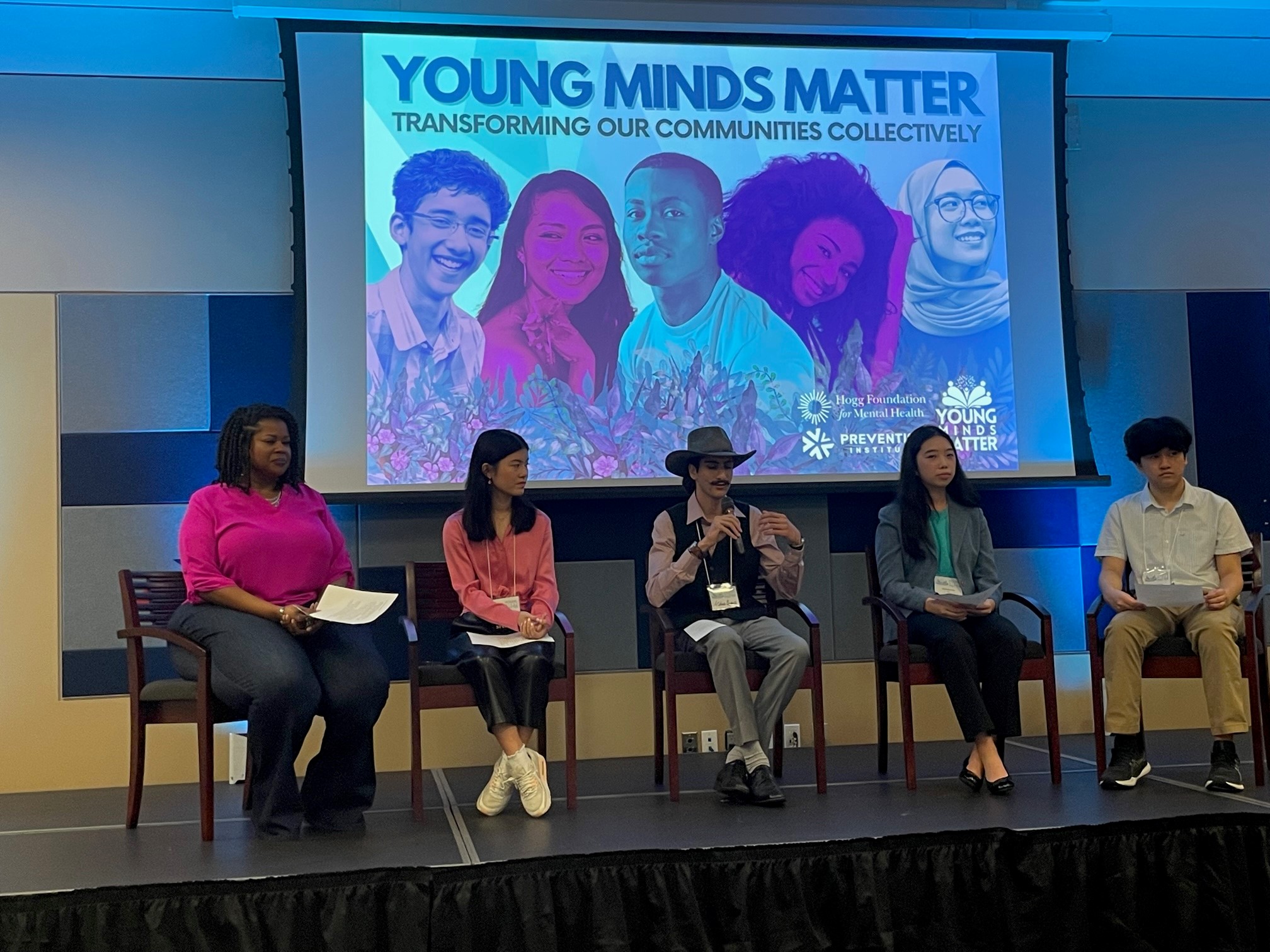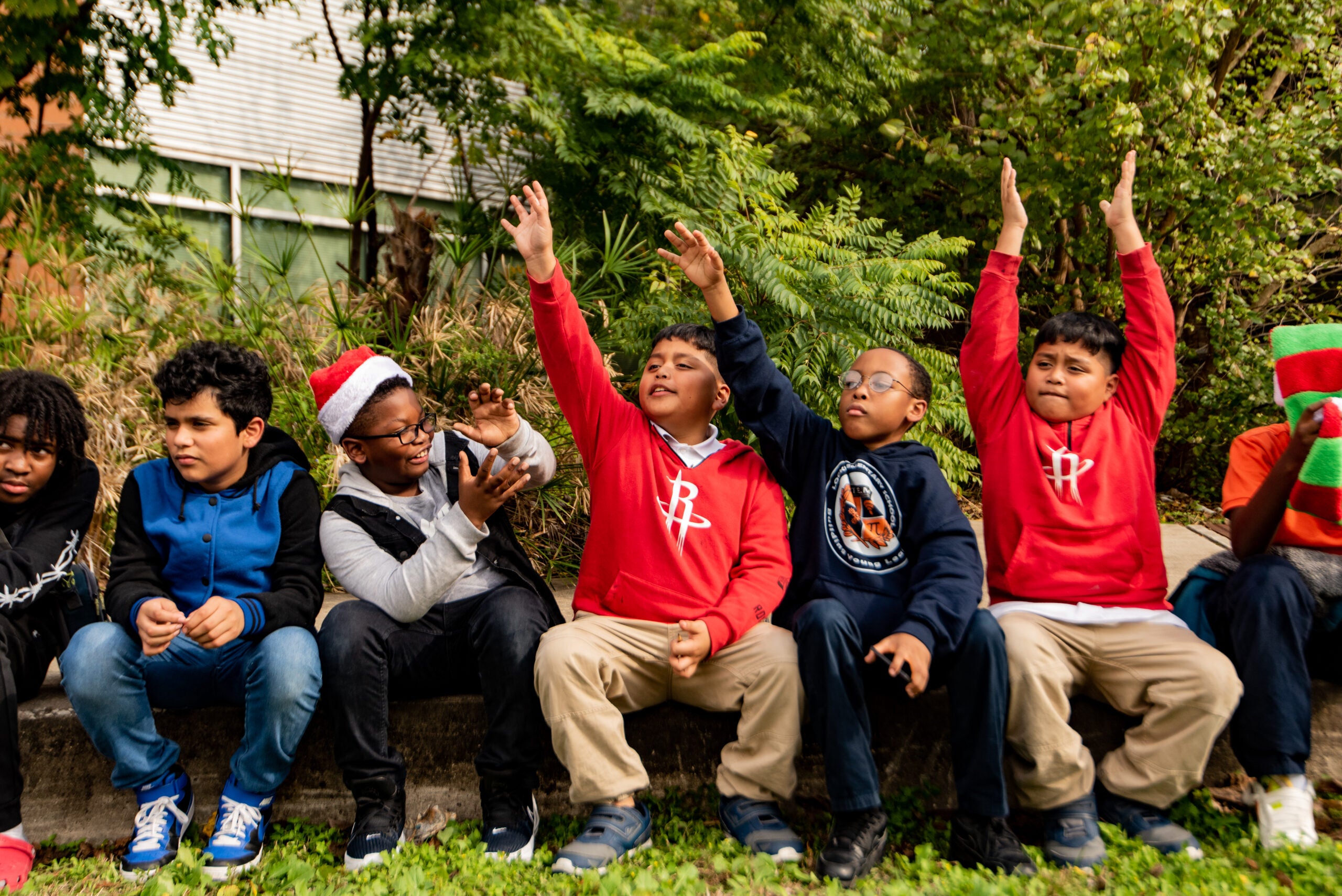2024 Impact Report
Communities of Care: Enhancing Mental Health and Community Resilience
The Communities of Care initiative represents a transformative effort aimed at enhancing mental health and community resilience, particularly focused on children, youth, and families of color. Launched in 2019, a total of $11.5 million was awarded to eleven organizations to support collaborative approaches to well-being in the Houston Metropolitan Statistical Area. Ten of the organizations were awarded $800,000 each to build on an existing community collaborative. The eleventh organization, Prevention Institute, received funding to coordinate and provide technical assistance to the initiative.
In 2023, in part to offset the impact of COVID, COC was extended for one year with an additional $1.35 million awarded.
For our 2024 Impact Report, the Hogg Foundation interviewed Sheila Savannah, Managing Director of Prevention Institute (PI). She discussed her organization’s impact on COC, the successes and challenges faced while working through the pandemic, and expectations moving forward.
Communities of Care Grantee Partners:
- Access Health
- Asian American Health Coalition Of The Greater Houston Area
- CHRISTUS Foundation For Health Care
- Family Service Center Of Galveston County
- First3Years
- Houston Parks Board
- Light And Salt Association
- Mental Health America Of Greater Houston
- MyConnect Community
- Neighborhood Recovery Community Development Corporation
- Prevention Institute
Successes
Each of the ten COC collaboratives consists of organizational stakeholders and community members from across sectors. They work together to address a wide range of community needs related to resilience, mental health, equity, and well-being. A key focus of the initiative, and of PI’s role, is to support member organizations in harnessing the strengths of collaboratives while mitigating the challenges. As Sheila tells it, COC has experienced a number of successes, especially as the initiative regained momentum in the post-pandemic years. These include:

- Young Minds Matter 2023: Young Minds Matter is a free convening co-hosted by the Hogg Foundation for Mental Health and Prevention Institute. The conference offers cutting-edge strategies for collaborating with children, youth, and families as decision-makers and leaders in their communities. The involvement of the collaboratives in planning conference topics and themes underscores the importance of community leadership.
- Progress on Policy: COC is engaged in a sustained effort to enhance collaborative members’ capacity to engage in impactful policy work. A COC policy workgroup has been established that will unify collaboratives around a shared policy agenda to improve school culture, climate, and services for youth mental well-being while enhancing youth and resident leadership.
- Reports to Community: The collaborative groups have produced reports reflecting their community work, facilitating discussions and data sharing to align with community priorities and adapt to emerging needs. The community reports also promote transparency and accountability, ensuring the initiative’s goals and actions align with community priorities.
- Capacity Building: COC focuses on upstream interventions, including building capacity to work on the root contributors to isolation and stigma. Through the extensive training, technical assistance, and peer learning offered across the initiative, COC works to ensure its long-term sustainability and resilience by creating an environment of shared expertise among all partners.
- Transition to In-Person Engagement: The initiative is returning to in-person meetings and convenings, fostering learning and connections among the ten collaboratives while also carrying forward the valuable lessons learned about how virtual spaces can support ongoing connection and access to engagement.
PI was pivotal in facilitating the assessment and planning phases of COC, which took place over the first two years of the initiative. For the implementation phase, PI continues focusing on engaging with the Evaluation Team to ensure collaborative impact is measured and shared with community members, and engaging residents and youth as leaders in their implementation strategies. PI also continues to provide individualized technical assistance and coaching tailored to each collaborative’s focus and needs.
“Technical assistance and facilitation is one aspect of our role as coordinators, but our engagement with COC goes so much deeper than that,” said Sheila. “We have walked this journey with these collaboratives and are a thought partner with the Hogg Foundation on considering COC’s impact, progress, and story.”
A key advantage to working with collaboratives rather than individual organizations is that it allows for diverse expertise to contribute to mental health and well-being efforts. Each group is learning more each year about their community in a dynamic way – the learning and sharing continues – it is also helping the collaboratives value the unique cultural differences and similarities across the greater Houston region.
“While all ten collaboratives share a common goal, each one contributes a unique area of focus, enriching the overall learning community with diverse perspectives and expertise.”
“While all ten collaboratives share a common goal, each one contributes a unique area of focus, enriching the overall learning community with diverse perspectives and expertise.” said Vicky Coffee, director of foundation initiatives for the Hogg Foundation and project lead for Communities of Care. “For example, a group focused on parks and green spaces can learn from a group focused on dismantling the school to prison pipeline.”
Community inclusion is vital in this work, said Sheila. “So, ensuring engagement of not just researchers or professionals, but also engaging lifelong residents and young people with a vested interest in improving their communities. The whole point is building capacity for community members to be supported in effectively improving their environments and driving change.”
Challenges
Even with all of the successes, PI has had to help collaboratives manage several challenges within COC. Some of the biggest ones:
- Frequent changes in team members within both the collaboratives and PI.
- Maintaining consistent engagement of youth and families.
- The inherent difficulty of shifting cultural attitudes toward mental health.
- Even when done well, collaborative work takes time to show impact.
- The political climate that continues to take place in the State of Texas.
At the community level, Sheila also notes the detrimental impact on youth of recently passed legislation. Examples she gives are curriculum censorship and book bans, hardening of schools, and the general attack on public schools that has been a mainstay of Texas politics.
“But on the other hand, these challenges are why we have made capacity building and sustainability such a focus,” said Sheila. “The hope is that COC collaboratives will keep a steady drum beat of what is useful and needed for youth, families, and communities to thrive; one that will be heard and have impact as policies are developed that affect their lives.”
Future Goals
The collaboratives are excited for the remaining months of the grant period, which ends in 2025. COC’s continued goals and path forward include:
- Understand the Community Environment: The collaboratives and PI will gather qualitative data to share lessons from the initiative and secure long-term investments in the model and communities.
- Imagine One Community: Plans include modeling youth engagement through Youth Voices for Change, developing regional learning forums, and creating profiles to showcase collaborative achievements.
- Talk about and Act on Health Justice: The focus will be on hosting dialogues and policy action forums related to racial justice and youth mental well-being. This includes leveraging partnerships, such as with the U.T. School of Public Health, and creating a COC legislative agenda.
- Provide Opportunities for Ongoing Learning: PI will continue to co-host learning activities, offer responsive technical assistance, and share resources to support collaboratives and leaders.
- Improve Community Well-Being: Collaboratives are implementing strategies for mental health improvement and engaging in sustainability planning to ensure long-term success beyond the initiative’s sixth year.
As Sheila notes, “This work is based on inclusive and growing relationships in communities that have been historically excluded from decision making. It’s about building trust, making space to resolve past traumas, and creating collective hopefulness for our children. Sustainability of the work must be considered throughout this type of project. This underscores the importance of long-term inclusive relationships and collaboration in achieving lasting impact.”





